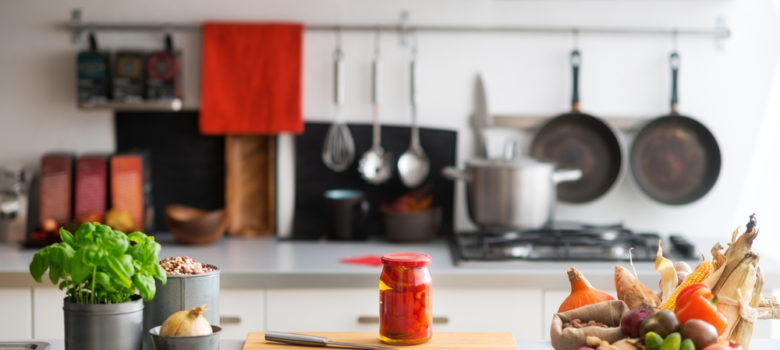
The kitchen is undoubtedly one of the most important rooms in any house, but it’s also where we use a huge amount of energy. Here at the Green Age have a commitment to improving energy efficiency without compromising quality of life, so rest assured that we’re not about to tell you to switch everything off and only ever eat raw celery and room temperature ice cream. This is a blog about the small changes you can make in your kitchen to cut your bills, save money, and feel better about your contribution to the environment.
Energy Saving Cooking
My favourite thing in the whole world is cooking. I’ve just moved in to a new place with a shiny new kitchen, so the first things I do upon getting home in the evenings are to pour a glass of wine, open the fridge, and decide what to cook for dinner. What I should really be doing is thinking about what’s in the fridge without wasting all that cold air holding the fridge door open. The poor thing then has to work twice as hard to bring the temperature back down once I’m done lollygagging. This is just the start, there are so many other things you can do to conserve energy in the kitchen.
- You know on Bake Off when they talk about how they really want to open the oven but it could make their cake sink? The reason it would do that and ruin their signature bake (no one say “baked alaska”) is of course because of all the hot air opening the oven loses. Not only does this negatively affect your food, but just like my fridge, your oven subsequently has to work twice as hard to reheat the air inside.
- The defrost setting on your microwave is for the WEAK. Save energy by taking out the food you want the night before.
- Speaking of your microwave though, it’s a lot more energy efficient
- Cook in batches. You’ll save heaps of energy by not needing to cook every meal from scratch. I’m not just referring to energy as gas and electric here, but as your own energy – sometimes the thought of whipping out your chefs hat after a long day is just repugnant. Better to make a lot of food at the start of the week and put some of that tupperware filling your cupboards to use. As long as you can find the right lid…
- Get to know your oven a little better. Every oven is different and will take a different amount of time to heat up, so learn how long yours needs to be on before it’s ready to start cooking. If you’ve got a fan oven then make sure to take advantage of it, it’ll speed up the process and
- When cooking on the hob, ensure you’ve chose the right size of pan and the right ring/burner for your purposes. That beautiful 30 inch wok you love so much might be great but it’s not really necessary for scrambled egg.
- Saucepan lids are designed for the specific purpose of keeping heat and moisture inside of the pan, meaning that they help to raise and maintain the temperature of the food you’re cooking. Happy days.
Energy Saving Washing
With so many labour-saving devices in our homes to help get us from rags to slightly cleaner rags riches, it’s important to know exactly how much energy and money are running down the drain with the old laundry water.
- Know the size of your drum and optimal load size. Not only in theory, but in practice. I’m not a good enough judge of weights to tell you how many kilos of clothes my washer takes, but I can tell you exactly how many pairs of socks and trousers it can wash at one time without the performance suffering.
- The ECO setting on your washing machine is not there to trick you. It’s designed to perform a proper, fully adequate wash without unnecessary heat and energy. Trust the ECO setting, it’s there to help you.
- There is just no world in which tumble dryers make any ecological sense at all. Convenience may be tempting, but consider using the dryer that nature gave you – washing lines and clothes horses cost little to buy and nothing to run.
Energy Saving Cleaning
Cleanliness is next to godliness, as the sign in our break room says.
- It’s good news for all my fellow hate-washing-up alumni! Dishwashers are more energy and water efficient than washing by hand so you finally have an excuse not to spend hours slaving over the sink.
- Once again, the ECO cycle on the dishwasher is on your side. With a decent detergent the results tend to be just as good while using much less power than your usual cycle.
- Be sensible with power hungry cleaning appliances like steam cleaners and high energy vacuums. For minor offenses often broom or hot damp cloth are more than up to the task.
The real key to saving energy in your kitchen is the same as saving energy anywhere else: be aware of your usage and use your brain. They call it the heart of the home for a reason… that reason being that it’s where we keep the chocolate.







Think we missed something? Do you have a different opinion?
Comment below to get your voice heard…












The ‘ECO’ setting my washing machine used less water and less electricity, however not a lot less and the cycle is 50% or more longer. Sometimes I wonder if the energy I am saving during the wash, is then being consumed by wearing out my clothes faster? Had anyone run any figures or study on this?